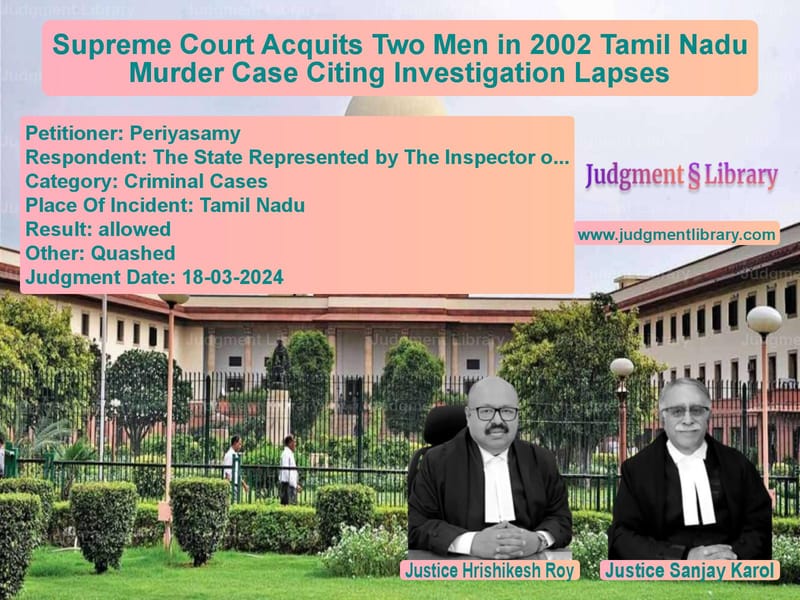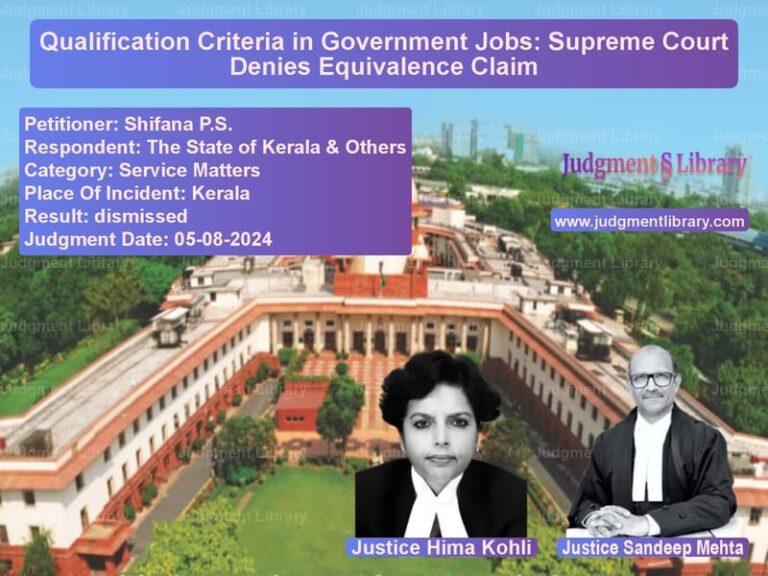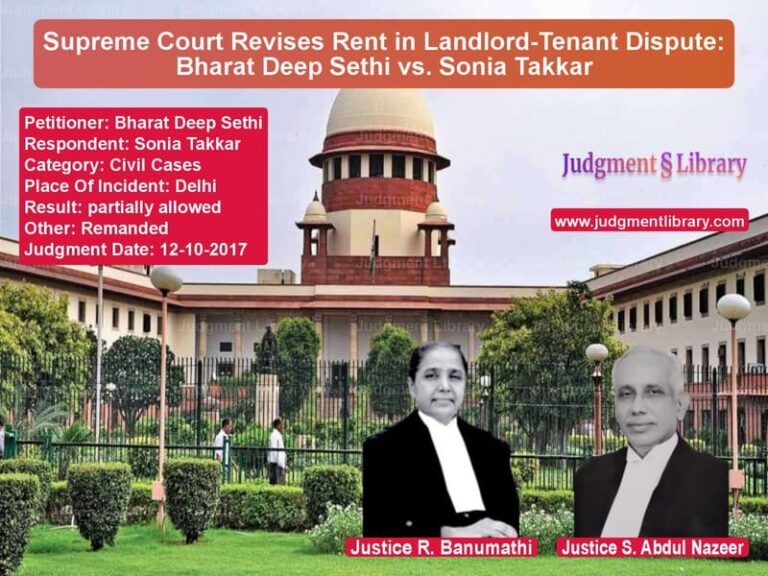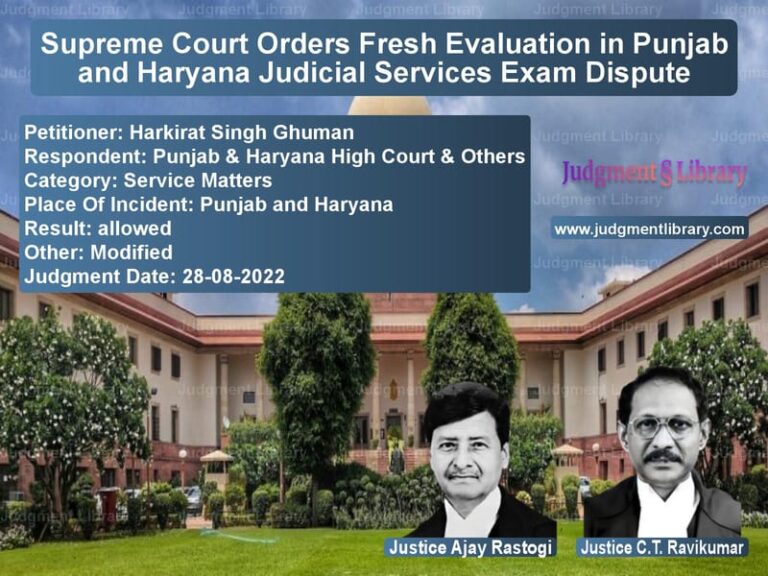Supreme Court Acquits Two Men in 2002 Tamil Nadu Murder Case Citing Investigation Lapses
The Supreme Court of India recently overturned the convictions of two men, Periyasamy and R. Manoharan, who were sentenced to life imprisonment in a 2002 double murder case in Tamil Nadu. The case, Periyasamy vs. The State Represented by The Inspector of Police, involved the fatal stabbing of two individuals during a violent altercation at a liquor shop.
The Supreme Court ruled that the prosecution had failed to prove its case beyond a reasonable doubt, citing inconsistencies in witness testimonies, delayed filing of the FIR, and critical lapses in the police investigation. The judgment highlights the importance of ensuring fair trials and preventing wrongful convictions.
Background of the Case
The incident occurred on March 3, 2002, at Saravana Wine Shop in Neithalur Colony, Tamil Nadu. According to the prosecution, a dispute arose when the deceased, Dharmalingam (D1), demanded liquor on credit. A quarrel escalated, leading to the breaking of shop showcases and liquor bottles.
The prosecution alleged that during the altercation:
- A-1 (Periyasamy) fatally stabbed D-1 and another victim, Thangavel (D2).
- A-2 (R. Manoharan) allegedly instigated A-1 to attack.
- Two other individuals were also injured in the assault.
Trial Court Findings
The prosecution examined 22 witnesses and presented 33 documents to establish the charges. The Trial Court convicted both accused, sentencing:
- A-1 (Periyasamy) to life imprisonment under Section 302 IPC for two counts of murder.
- A-2 (R. Manoharan) to life imprisonment under Section 302 IPC read with Section 109 IPC for abetment.
- Both were sentenced to seven years rigorous imprisonment for attempted murder.
High Court’s Confirmation of Conviction
The Madurai Bench of the Madras High Court upheld the conviction in 2014, rejecting the defense’s argument that the FIR did not mention A-2’s involvement. The High Court held that the prosecution’s case stood proven beyond doubt based on the testimonies of injured witnesses.
Appeal to the Supreme Court
The accused challenged the High Court’s decision, arguing that:
- Witnesses were interested parties and not independent.
- The FIR was delayed and lacked key details.
- The investigation was flawed and did not explain the accused’s injuries.
- No independent eyewitnesses were examined despite the shop being in a crowded area.
Supreme Court’s Key Observations
1. Delay in Lodging the FIR
“The FIR was recorded hours after the incident despite police officers being informed earlier. This delay remains unexplained and raises doubts about the authenticity of the prosecution’s case.”
2. Lack of Independent Witnesses
- The Court noted that the crime occurred in a busy area, yet the prosecution relied only on witnesses related to the deceased.
- Independent bystanders who were present were not examined.
“When an incident occurs in a crowded space, the absence of independent witnesses is a major flaw in the investigation.”
3. Inconsistent Witness Testimonies
- PW-1 and PW-2 gave contradictory statements about whether A-2 instigated A-1.
- One witness initially claimed that A-2 handed the knife to A-1 but later changed his statement.
“The prosecution’s key witnesses provided inconsistent versions of the events, making their testimonies unreliable.”
4. Lack of Medical Evidence
- PW-1 claimed to have undergone surgery due to stab wounds, but no medical records supported this claim.
- The doctor who allegedly issued the wound certificate was not examined.
“The failure to produce medical evidence weakens the prosecution’s case, especially when injuries are central to proving an attempted murder charge.”
5. Investigation Lapses
- The investigating officer failed to conduct a proper forensic examination of the crime scene.
- There was no explanation for why A-2 was arrested at a bus stand days later.
- Evidence was tampered with, as seen in handwritten interpolations in key documents.
“The prosecution failed to conduct a fair and unbiased investigation, raising serious doubts about the authenticity of the case.”
Final Verdict
The Supreme Court acquitted both accused and ordered their immediate release, stating:
“The prosecution has failed to prove its case beyond reasonable doubt. The appeals are allowed, and the convictions are set aside.”
Conclusion
The Supreme Court’s ruling highlights key principles of criminal law:
- Burden of proof: The prosecution must establish guilt beyond reasonable doubt.
- Fair investigation: The police must conduct unbiased investigations with proper forensic support.
- Reliability of witnesses: Testimonies must be consistent and corroborated by independent evidence.
- Protection of accused rights: Courts must ensure wrongful convictions do not occur due to procedural lapses.
This judgment reinforces the principle that justice must not only be done but also seen to be done, ensuring no individual is convicted without strong and reliable evidence.
Petitioner Name: Periyasamy.Respondent Name: The State Represented by The Inspector of Police.Judgment By: Justice Hrishikesh Roy, Justice Sanjay Karol.Place Of Incident: Tamil Nadu.Judgment Date: 18-03-2024.
Don’t miss out on the full details! Download the complete judgment in PDF format below and gain valuable insights instantly!
Download Judgment: periyasamy-vs-the-state-represente-supreme-court-of-india-judgment-dated-18-03-2024.pdf
Directly Download Judgment: Directly download this Judgment
See all petitions in Murder Cases
See all petitions in Bail and Anticipatory Bail
See all petitions in Judgment by Hrishikesh Roy
See all petitions in Judgment by Sanjay Karol
See all petitions in allowed
See all petitions in Quashed
See all petitions in supreme court of India judgments March 2024
See all petitions in 2024 judgments
See all posts in Criminal Cases Category
See all allowed petitions in Criminal Cases Category
See all Dismissed petitions in Criminal Cases Category
See all partially allowed petitions in Criminal Cases Category







